人教英语选修7 Unit5 Travelling abroad Grammar(共31张PPT)
文档属性
| 名称 | 人教英语选修7 Unit5 Travelling abroad Grammar(共31张PPT) |
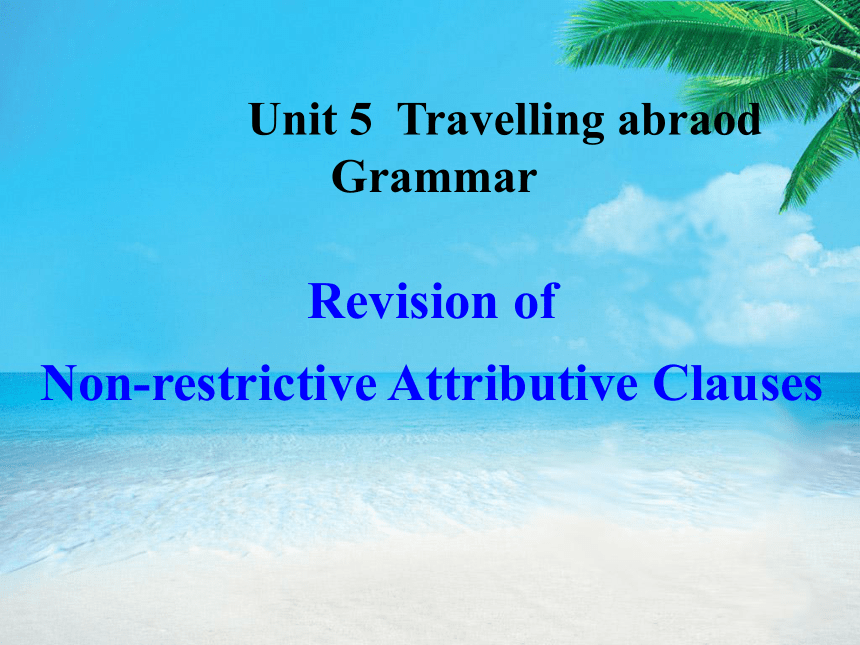
|
|
| 格式 | zip | ||
| 文件大小 | 462.5KB | ||
| 资源类型 | 教案 | ||
| 版本资源 | 人教版(新课程标准) | ||
| 科目 | 英语 | ||
| 更新时间 | 2020-03-25 00:00:00 | ||
图片预览


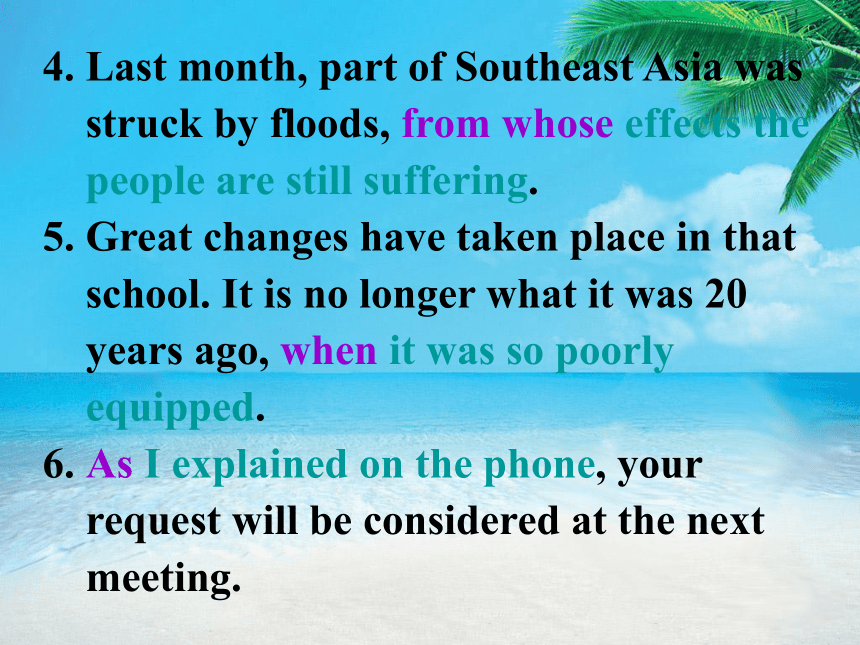
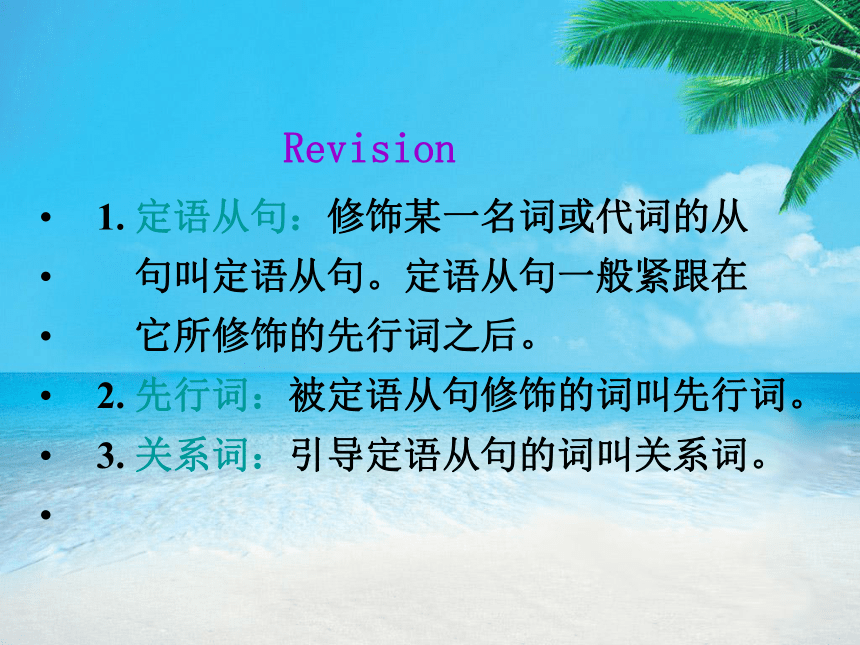

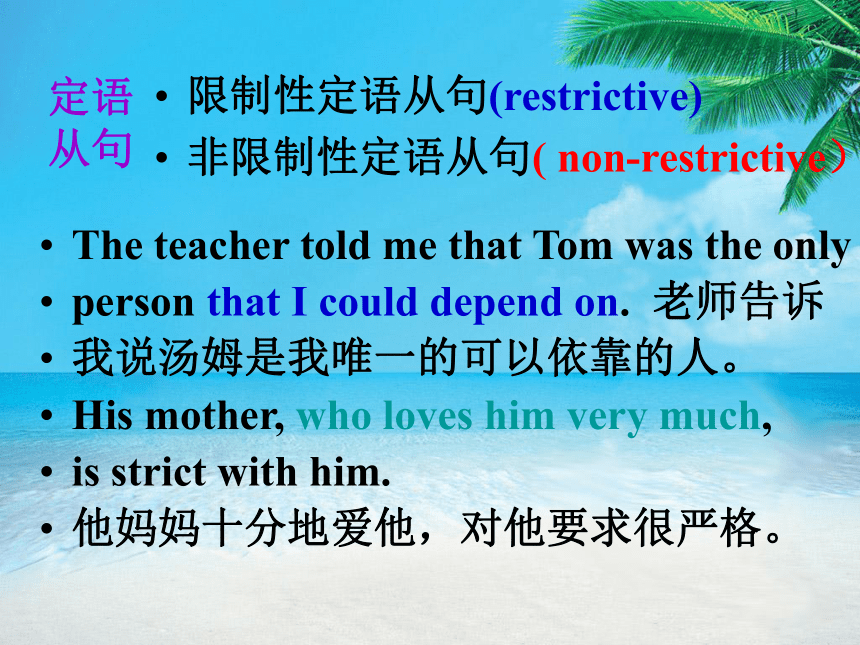



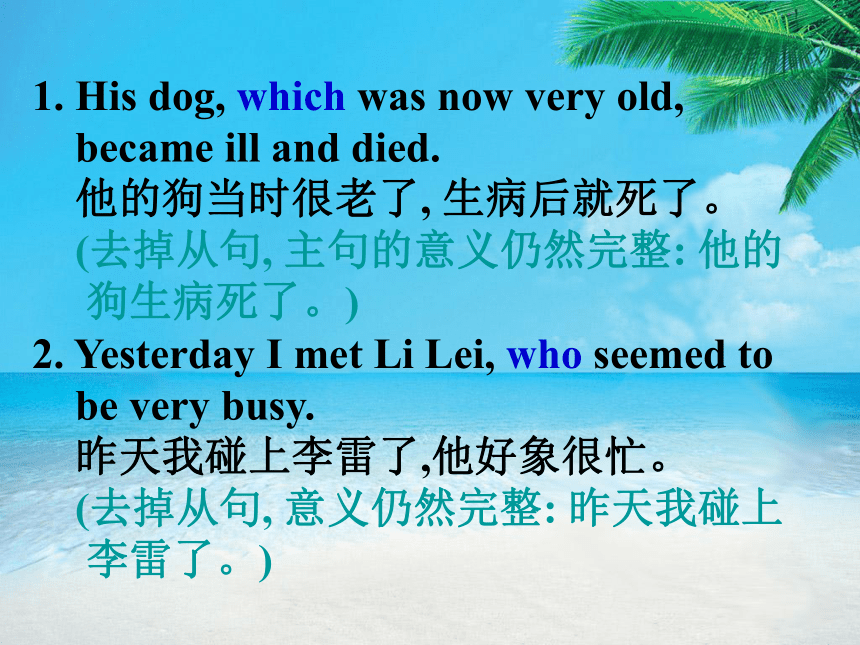
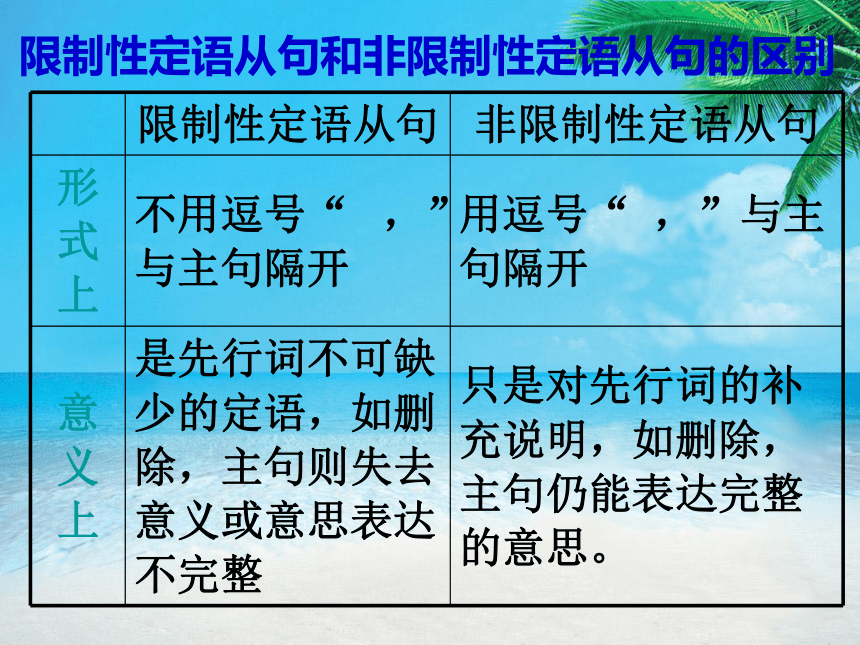
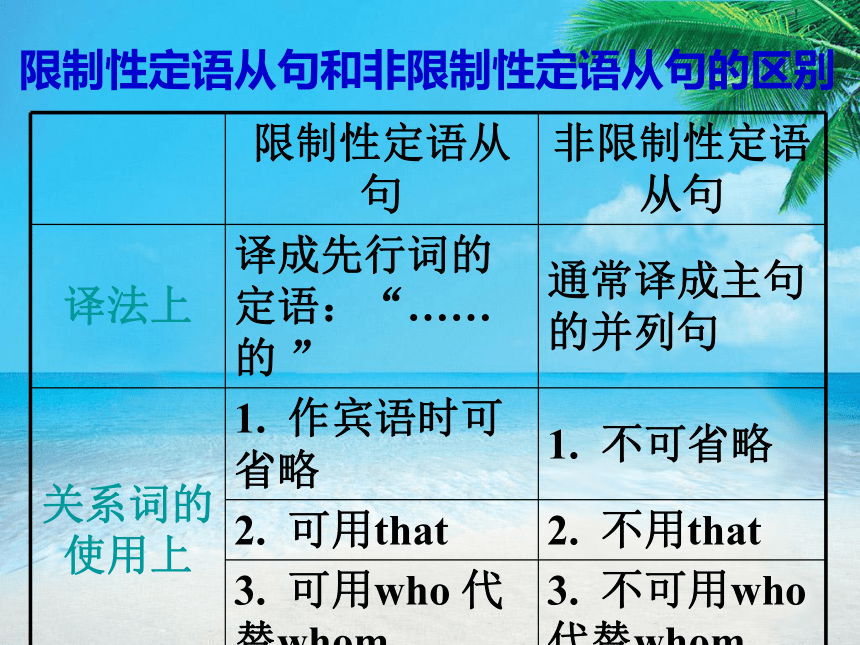
文档简介
(共31张PPT)
Revision of
Non-restrictive Attributive Clauses
Unit 5 Travelling abraod
Grammar
They’ve won their last three matches,
which I find a bit surprising actually.
2. I met Mr. Huang this morning, who is
our general manager.
3. For many cities in the world, there is no
room to spread out further, of which
New York is an example.
4. Last month, part of Southeast Asia was
struck by floods, from whose effects the
people are still suffering.
5. Great changes have taken place in that
school. It is no longer what it was 20
years ago, when it was so poorly
equipped.
6. As I explained on the phone, your
request will be considered at the next
meeting.
1. 定语从句:修饰某一名词或代词的从
句叫定语从句。定语从句一般紧跟在
它所修饰的先行词之后。
2. 先行词:被定语从句修饰的词叫先行词。
3. 关系词:引导定语从句的词叫关系词。
?? ??
Revision
??关系词有关系代词和关系副词。
关系代词有that, which, who, whom, whose, as;关系副词有when, where, why。??????
关系词通常有下列三个作用:
A. 引导定语从句
B. 代替先行词
C. 在定语从句中担当一个成分
限制性定语从句(restrictive)
非限制性定语从句( non-restrictive)
定语
从句
The teacher told me that Tom was the only
person that I could depend on.? 老师告诉
我说汤姆是我唯一的可以依靠的人。
His mother, who loves him very much,
is strict with him.?
他妈妈十分地爱他,对他要求很严格。
限制性定语从句:
所谓限制性定语从句就是先行词在意义
上不可缺少的定语, 如果去掉, 主句就失
去意义或意义不完整。这种从句和先行
词的关系十分密切, 写时不用逗号和主
句分开。
限制性定语从句和非限制性定语从句:
I was the only person in my office who was
invited.
我是我们办公室唯一被邀请的人。
(如果把从句部分去掉, 整个句子的含义就
变了。)
非限制性定语从句:
非限制性定语从句和主句的关系并不十
分密切, 只是对先行词做些附加说明, 如
果去掉, 主句的意思仍然清楚。这种从
句和主句之间往往用逗号隔开。在讲话
时须停顿,一般不用that引导。
1. His dog, which was now very old,
became ill and died.
他的狗当时很老了, 生病后就死了。
(去掉从句, 主句的意义仍然完整: 他的
狗生病死了。)
2. Yesterday I met Li Lei, who seemed to
be very busy.
昨天我碰上李雷了,他好象很忙。
(去掉从句, 意义仍然完整: 昨天我碰上
李雷了。)
限制性定语从句和非限制性定语从句的区别
限制性定语从句 非限制性定语从句
形式上 不用逗号“ ,”与主句隔开 用逗号“ ,”与主句隔开
意义上 是先行词不可缺少的定语,如删除,主句则失去意义或意思表达不完整 只是对先行词的补充说明,如删除,主句仍能表达完整的意思。
限制性定语从句和非限制性定语从句的区别
限制性定语从句 非限制性定语从句
译法上 译成先行词的定语:“……的 ” 通常译成主句的并列句
关系词的使用上 1. 作宾语时可省略 1. 不可省略
2. 可用that 2. 不用that
3. 可用who 代替whom 3. 不可用who 代替whom
A. This is the place where I lived ten
years ago.
B. She is going to spend the winter
holiday in Macao, which returned to
China in 1999.
2. A. He is a man who I can ask for help.
B. His father, who works in Beijing,
came back yesterday.
限制性定语从句和先行词关系密切,如果去掉从句,剩余部分意义不完整;非限制性定语从句只是先行词的附加说明,如果去掉从句,意义仍然完整。
All the magazines here which have beautiful pictures in them were written by him.
里面有漂亮图画的那些杂志是他写的。
All the magazines here, which have beautiful pictures in them, were written by him.
所有的杂志都是他写的, 里面都有漂亮的图画。
有时同一个限制性从句变为非限制性从句会改变全句的意思。
(杂志有带图画和不带图画两类)
(杂志只有一种)
His father, who works in Beijing, came back yesterday.
当先行词是地名人名、世界上独一无二的事物或家庭唯一成员时,通常只用非限制性定语从句。
Shanghai, which is in East China, is developing rapidly.
在of which/whom之前可以使用表达数量或定位的数词或代词。
1. I am doing different types of exercises, all of which are quite helpful to my health.
2. Many people, some of whom
are not overweight, are going on diets.
3. There are 54 students in my class, three of whom come from the US.
The town where I live is beautiful.
Kenli, where I live, is beautiful.
Teachers who are kind are popular with
the students.
Mr Wang, who is kind, is popular with
the students.
Please compare:
Teachers who are kind are popular with the students.
Mr Wang, who is kind, is popular with the students.
分析两种定语从句省略后的结果
The town where I live is beautiful.
Kenli, where I live, is beautiful.
限制性定语从句省略后主语所指就不明确,所以不能省略。
非限制性定语从句和单句的比较
1. He failed in the exam._______ made his
parents angry.
2. He failed in the exam, _______made his
parents angry.
3. He has two sons. Both of ________ are
teachers.
4. He has two sons, both of ________ are
teachers.
This
which
whom
them
× that
一、 非限制性定语从句通常不能用that引
导。
1. I like the book, which was bought
yesterday.
我喜欢这本书,这是昨天买的。
2. I like the book which / that was bought
yesterday.
我喜欢昨天买的那本书。
非限制性定语从句应注意以下几点:
二、 非限制性定语从句不能用why引导
要用for which代替why。
1. I had told them the reason, for which I
didn’t attend the meeting.
我已经把理由告诉了他们,为此我没有
去开会。
2. I had told them the reason why I didn't
attend the meeting.
我告诉了他们我不去开会的理由。
(限制性定语从句“the reason why...”是常见搭配。)
三、 非限制性定语从句置于句首时,不能用which引导。关系代词as引导非限制性定语从句位置比较灵活,可以放主句前,也可以放主句后。
1. As I expected, he didn't believe me.
正如我所预料的,他不相信我。
2. She heard a terrible noise, which brought
her heart into her mouth.
她听到一个可怕的声音,这让她把心
都提到嗓子眼了。
四、 非限制性定语从句由“介词+关系代词”引导时,其中的关系代词不能用as。
1. He bought the car for more than $20,000,
with which his father was angry.
他花两万多美元买了这辆车,他父亲对
此很生气。
2. I finished my work ahead of time, after
which I sat some time reading the
newspaper.
我提前干完了我的活,随后我坐着看了
会儿报纸。
五、 在非限制性定语从句中,指人的关系代词作宾语时,只能用宾格whom; 不能用who替换,也不能省略。
1. Do you know Tom, whom we talked about? 你认识汤姆吗? 我们谈到过他。
2. This book, which you can get at any bookshop, will give you all the information you need.
这本书会给你提供所有你需要的资料,它在任何一家书店都能买到。
(非限制性定语从句中引导词在从句中作宾语,无论指人还是指物都不能省略。)
六、Which可指前面整个句子。
The sun sends out light and heat, which
makes it possible for living things to exist
on the earth.
太阳发出光和热,这使得生物能够在地球
上生存。
His father is an engineer, ____ makes him
very proud.
A. for what B. which
C. that D. what
1. Yesterday Mr. Li finally bought his
own house, _______ is a hospital.
A. in where B. to the east of which
C. to the east of it D. in the east of that
2. My brother's purse, _______ he put
¥1,000, was missing on the bus.
A. there B. which
C. in which D. that
课堂练兵
3. His glasses, _______ he could see
nothing, was taken away by a naughty
boy.
A. which B. without which
C. with which D. without those
4. The computer, _______ he paid ¥3,000,
was once owned by his uncle.
A. which B. for which
C. that D. to that
5. In the past we lost many chances, _______ we paid little attention. A. which B. that
C. in which D. to which
6. The pen, _______ I had been writing for ten years, was broken. A. with which B. with that
C. as D. with it
7. Mary has two brothers, ________ are
doctors.
A. both of they B. both of whom
C. both of them D. whom of both
8. On the way home I met my friend
John, from _______ home the thief
had stolen a computer.
A. whom B. which
C. that D. whose
9. Paul, _________ everyone suspected,
turned out to be innocent.
A. that B. when
C. which D. whom
10. When deeply absorbed in work,
_________ he often was, he would
forget all about eating or sleeping.
A. what B. as
C. that D. who
11. She showed her teacher a reason,
________ she was late for school the
day before yesterday.
A. that B. which
C. for which D. why
12. The 10:00 train, _______ is usually
very punctual, was late this morning.
A. as B. when
C. that D. which
Revision of
Non-restrictive Attributive Clauses
Unit 5 Travelling abraod
Grammar
They’ve won their last three matches,
which I find a bit surprising actually.
2. I met Mr. Huang this morning, who is
our general manager.
3. For many cities in the world, there is no
room to spread out further, of which
New York is an example.
4. Last month, part of Southeast Asia was
struck by floods, from whose effects the
people are still suffering.
5. Great changes have taken place in that
school. It is no longer what it was 20
years ago, when it was so poorly
equipped.
6. As I explained on the phone, your
request will be considered at the next
meeting.
1. 定语从句:修饰某一名词或代词的从
句叫定语从句。定语从句一般紧跟在
它所修饰的先行词之后。
2. 先行词:被定语从句修饰的词叫先行词。
3. 关系词:引导定语从句的词叫关系词。
?? ??
Revision
??关系词有关系代词和关系副词。
关系代词有that, which, who, whom, whose, as;关系副词有when, where, why。??????
关系词通常有下列三个作用:
A. 引导定语从句
B. 代替先行词
C. 在定语从句中担当一个成分
限制性定语从句(restrictive)
非限制性定语从句( non-restrictive)
定语
从句
The teacher told me that Tom was the only
person that I could depend on.? 老师告诉
我说汤姆是我唯一的可以依靠的人。
His mother, who loves him very much,
is strict with him.?
他妈妈十分地爱他,对他要求很严格。
限制性定语从句:
所谓限制性定语从句就是先行词在意义
上不可缺少的定语, 如果去掉, 主句就失
去意义或意义不完整。这种从句和先行
词的关系十分密切, 写时不用逗号和主
句分开。
限制性定语从句和非限制性定语从句:
I was the only person in my office who was
invited.
我是我们办公室唯一被邀请的人。
(如果把从句部分去掉, 整个句子的含义就
变了。)
非限制性定语从句:
非限制性定语从句和主句的关系并不十
分密切, 只是对先行词做些附加说明, 如
果去掉, 主句的意思仍然清楚。这种从
句和主句之间往往用逗号隔开。在讲话
时须停顿,一般不用that引导。
1. His dog, which was now very old,
became ill and died.
他的狗当时很老了, 生病后就死了。
(去掉从句, 主句的意义仍然完整: 他的
狗生病死了。)
2. Yesterday I met Li Lei, who seemed to
be very busy.
昨天我碰上李雷了,他好象很忙。
(去掉从句, 意义仍然完整: 昨天我碰上
李雷了。)
限制性定语从句和非限制性定语从句的区别
限制性定语从句 非限制性定语从句
形式上 不用逗号“ ,”与主句隔开 用逗号“ ,”与主句隔开
意义上 是先行词不可缺少的定语,如删除,主句则失去意义或意思表达不完整 只是对先行词的补充说明,如删除,主句仍能表达完整的意思。
限制性定语从句和非限制性定语从句的区别
限制性定语从句 非限制性定语从句
译法上 译成先行词的定语:“……的 ” 通常译成主句的并列句
关系词的使用上 1. 作宾语时可省略 1. 不可省略
2. 可用that 2. 不用that
3. 可用who 代替whom 3. 不可用who 代替whom
A. This is the place where I lived ten
years ago.
B. She is going to spend the winter
holiday in Macao, which returned to
China in 1999.
2. A. He is a man who I can ask for help.
B. His father, who works in Beijing,
came back yesterday.
限制性定语从句和先行词关系密切,如果去掉从句,剩余部分意义不完整;非限制性定语从句只是先行词的附加说明,如果去掉从句,意义仍然完整。
All the magazines here which have beautiful pictures in them were written by him.
里面有漂亮图画的那些杂志是他写的。
All the magazines here, which have beautiful pictures in them, were written by him.
所有的杂志都是他写的, 里面都有漂亮的图画。
有时同一个限制性从句变为非限制性从句会改变全句的意思。
(杂志有带图画和不带图画两类)
(杂志只有一种)
His father, who works in Beijing, came back yesterday.
当先行词是地名人名、世界上独一无二的事物或家庭唯一成员时,通常只用非限制性定语从句。
Shanghai, which is in East China, is developing rapidly.
在of which/whom之前可以使用表达数量或定位的数词或代词。
1. I am doing different types of exercises, all of which are quite helpful to my health.
2. Many people, some of whom
are not overweight, are going on diets.
3. There are 54 students in my class, three of whom come from the US.
The town where I live is beautiful.
Kenli, where I live, is beautiful.
Teachers who are kind are popular with
the students.
Mr Wang, who is kind, is popular with
the students.
Please compare:
Teachers who are kind are popular with the students.
Mr Wang, who is kind, is popular with the students.
分析两种定语从句省略后的结果
The town where I live is beautiful.
Kenli, where I live, is beautiful.
限制性定语从句省略后主语所指就不明确,所以不能省略。
非限制性定语从句和单句的比较
1. He failed in the exam._______ made his
parents angry.
2. He failed in the exam, _______made his
parents angry.
3. He has two sons. Both of ________ are
teachers.
4. He has two sons, both of ________ are
teachers.
This
which
whom
them
× that
一、 非限制性定语从句通常不能用that引
导。
1. I like the book, which was bought
yesterday.
我喜欢这本书,这是昨天买的。
2. I like the book which / that was bought
yesterday.
我喜欢昨天买的那本书。
非限制性定语从句应注意以下几点:
二、 非限制性定语从句不能用why引导
要用for which代替why。
1. I had told them the reason, for which I
didn’t attend the meeting.
我已经把理由告诉了他们,为此我没有
去开会。
2. I had told them the reason why I didn't
attend the meeting.
我告诉了他们我不去开会的理由。
(限制性定语从句“the reason why...”是常见搭配。)
三、 非限制性定语从句置于句首时,不能用which引导。关系代词as引导非限制性定语从句位置比较灵活,可以放主句前,也可以放主句后。
1. As I expected, he didn't believe me.
正如我所预料的,他不相信我。
2. She heard a terrible noise, which brought
her heart into her mouth.
她听到一个可怕的声音,这让她把心
都提到嗓子眼了。
四、 非限制性定语从句由“介词+关系代词”引导时,其中的关系代词不能用as。
1. He bought the car for more than $20,000,
with which his father was angry.
他花两万多美元买了这辆车,他父亲对
此很生气。
2. I finished my work ahead of time, after
which I sat some time reading the
newspaper.
我提前干完了我的活,随后我坐着看了
会儿报纸。
五、 在非限制性定语从句中,指人的关系代词作宾语时,只能用宾格whom; 不能用who替换,也不能省略。
1. Do you know Tom, whom we talked about? 你认识汤姆吗? 我们谈到过他。
2. This book, which you can get at any bookshop, will give you all the information you need.
这本书会给你提供所有你需要的资料,它在任何一家书店都能买到。
(非限制性定语从句中引导词在从句中作宾语,无论指人还是指物都不能省略。)
六、Which可指前面整个句子。
The sun sends out light and heat, which
makes it possible for living things to exist
on the earth.
太阳发出光和热,这使得生物能够在地球
上生存。
His father is an engineer, ____ makes him
very proud.
A. for what B. which
C. that D. what
1. Yesterday Mr. Li finally bought his
own house, _______ is a hospital.
A. in where B. to the east of which
C. to the east of it D. in the east of that
2. My brother's purse, _______ he put
¥1,000, was missing on the bus.
A. there B. which
C. in which D. that
课堂练兵
3. His glasses, _______ he could see
nothing, was taken away by a naughty
boy.
A. which B. without which
C. with which D. without those
4. The computer, _______ he paid ¥3,000,
was once owned by his uncle.
A. which B. for which
C. that D. to that
5. In the past we lost many chances, _______ we paid little attention. A. which B. that
C. in which D. to which
6. The pen, _______ I had been writing for ten years, was broken. A. with which B. with that
C. as D. with it
7. Mary has two brothers, ________ are
doctors.
A. both of they B. both of whom
C. both of them D. whom of both
8. On the way home I met my friend
John, from _______ home the thief
had stolen a computer.
A. whom B. which
C. that D. whose
9. Paul, _________ everyone suspected,
turned out to be innocent.
A. that B. when
C. which D. whom
10. When deeply absorbed in work,
_________ he often was, he would
forget all about eating or sleeping.
A. what B. as
C. that D. who
11. She showed her teacher a reason,
________ she was late for school the
day before yesterday.
A. that B. which
C. for which D. why
12. The 10:00 train, _______ is usually
very punctual, was late this morning.
A. as B. when
C. that D. which
